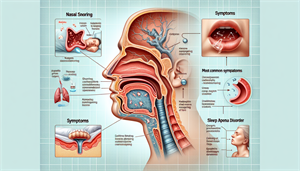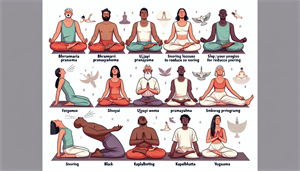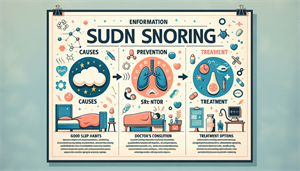
Can You Snore Through Your Nose?
Snoring - we’ve all encountered it in some form or another. But did you know that not all snoring is the same? In fact, the sounds emanating from our noses and mouths as we slumber can be quite telling. One particular type, nasal snoring, can not only be a nuisance but also a sign of underlying health issues. Intrigued? Let’s explore this noisy nocturnal phenomenon together, and answer the question: can you snore through your nose?
In this journey into the world of nasal snoring, we’ll delve into its causes, symptoms, and its connection to a serious sleep disorder - sleep apnea. We’ll guide you on figuring out if you’re a nose snorer and arm you with strategies to combat it.
Key Takeaways
Nasal snoring is caused by airway obstruction resulting from structural issues, inflammatory conditions, or allergies, and can lead to vibrations in the nasal tissues similar to an obstructed wind instrument. Nasal snoring is closely connected to sleep apnea, a disorder that involves breathing interruptions during sleep, and can arise from abnormalities in nasal or pharyngeal structures. Various strategies to combat nasal snoring include lifestyle changes, home remedies like nasal strips and humidifiers, and medical treatments such as surgical interventions, oral appliances, or CPAP therapy.
Nasal Snoring Explained
Nasal snoring is more than just a nighttime nuisance. It’s the result of airway obstruction, leading to vibrations in the nasal tissues. Imagine a wind instrument, like a saxophone. When the airway or ‘windpipe’ is clear, air flows smoothly, creating a pleasant sound. But what if there’s an obstruction? The instrument produces an entirely different, often unpleasant sound, similar to snoring. This bothersome symphony can be orchestrated by: Structural issues such as a deviated septum Inflammatory conditions that lead to nasal obstruction Nasal polyps or pet and dust allergies that induce congestion and obstruct the nasal airway.
Causes of Nasal Snoring
A stuffy nose, breathing difficulties, and irregular snoring sounds are the telltale signs of nasal snoring. But what causes this type of snoring? Just like a traffic jam can be caused by roadworks or an accident, nasal snoring can be attributed to various factors. Common culprits of snoring include: Allergies, which can lead to nasal congestion, sneezing, and a runny nose A simple cold, which can cause nasal congestion or narrowing, leading to an increase in the probability and volume of snoring Anatomical issues, such as a deviated septum, which can obstruct the airflow through the nasal passages These factors can all contribute to why snoring occurs during sleep.
Symptoms of Nasal Snoring
Recognizing the symptoms of nasal snoring is the first step towards managing it effectively. But, what signs should you be on the lookout for? Typically, nasal snoring can be accompanied by symptoms such as witnessed breathing pauses during sleep, excessive daytime sleepiness, difficulty concentrating, morning headaches, and a sore throat upon waking up. Chronic nasal snoring can present indicators like blocked or misshapen sinus cavities, quiet vibrations, and sinus inflammation. Nasal snoring resulting from sinusitis may include a sensation of inadequate sleep and worsening of snoring when throat muscles relax. Not to mention, congestion from sinus problems or a stuffy nose can contribute to nasal snoring symptoms.
The Connection Between Nasal Snoring and Sleep Apnea
Having covered the causes and symptoms of nasal snoring, we must also consider its potential link to a serious sleep disorder - sleep apnea. This disorder, characterized by breathing interruptions and choking episodes during sleep, can have serious health implications if left untreated. The connection between nasal snoring and obstructive sleep apnea is primarily due to nasal and pharyngeal abnormalities.


